英本主义对英语培训机构中学生和母语非英文的英语教师的影响
中英文化差异对英语学习的影响及对策
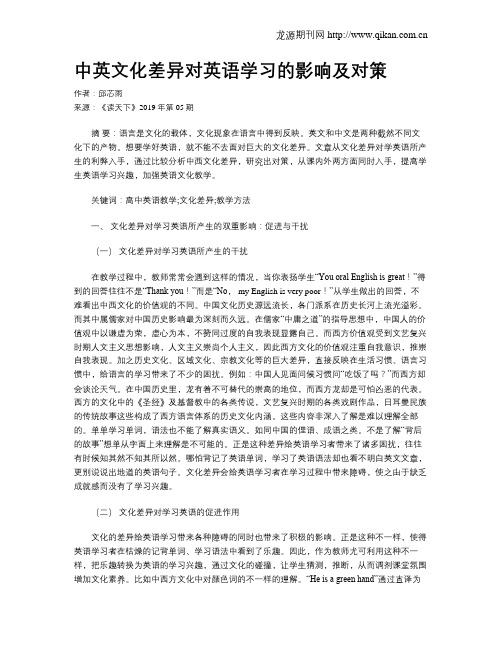
中英文化差异对英语学习的影响及对策作者:邱芯雨来源:《读天下》2019年第05期摘要:语言是文化的载体,文化现象在语言中得到反映。
英文和中文是两种截然不同文化下的产物。
想要学好英语,就不能不去面对巨大的文化差异。
文章从文化差异对学英语所产生的利弊入手,通过比较分析中西文化差异,研究出对策,从课内外两方面同时入手,提高学生英语学习兴趣,加强英语文化教学。
关键词:高中英语教学;文化差异;教学方法一、文化差异对学习英语所产生的双重影响:促进与干扰(一)文化差异对学习英语所产生的干扰在教学过程中,教师常常会遇到这样的情况,当你表扬学生“You oral English is great!”得到的回答往往不是“Thank you!”而是“No, my English is very poor!”从学生做出的回答,不难看出中西文化的价值观的不同。
中国文化历史源远流长,各门派系在历史长河上流光溢彩。
而其中属儒家对中国历史影响最为深刻而久远。
在儒家“中庸之道”的指导思想中,中国人的价值观中以谦虚为荣,虚心为本,不赞同过度的自我表现显露自己。
而西方价值观受到文艺复兴时期人文主义思想影响,人文主义崇尚个人主义,因此西方文化的价值观注重自我意识,推崇自我表现。
加之历史文化、区域文化、宗教文化等的巨大差异,直接反映在生活习惯、语言习惯中,给语言的学习带来了不少的困扰。
例如:中国人见面问候习惯问“吃饭了吗?”而西方却会谈论天气。
在中国历史里,龙有着不可替代的崇高的地位,而西方龙却是可怕凶恶的代表。
西方的文化中的《圣经》及基督教中的各类传说,文艺复兴时期的各类戏剧作品,日耳曼民族的传统故事这些构成了西方语言体系的历史文化内涵。
这些内容非深入了解是难以理解全部的。
单单学习单词,语法也不能了解真实语义。
如同中国的俚语、成语之类。
不是了解“背后的故事”想单从字面上来理解是不可能的。
正是这种差异给英语学习者带来了诸多困扰,往往有时候知其然不知其所以然。
西方外语教育对中国英语教育的启示
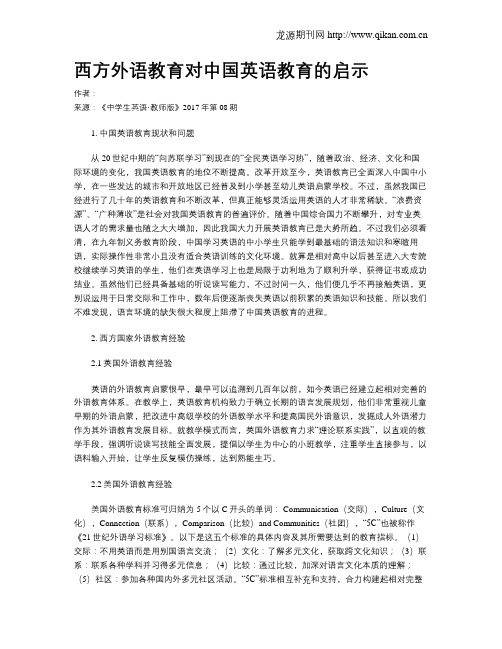
西方外语教育对中国英语教育的启示作者:来源:《中学生英语·教师版》2017年第08期1. 中国英语教育现状和问题从20世纪中期的“向苏联学习”到现在的“全民英语学习热”,随着政治、经济、文化和国际环境的变化,我国英语教育的地位不断提高。
改革开放至今,英语教育已全面深入中国中小学,在一些发达的城市和开放地区已经普及到小学甚至幼儿英语启蒙学校。
不过,虽然我国已经进行了几十年的英语教育和不断改革,但真正能够灵活运用英语的人才非常稀缺。
“浪费资源”、“广种薄收”是社会对我国英语教育的普遍评价。
随着中国综合国力不断攀升,对专业英语人才的需求量也随之大大增加,因此我国大力开展英语教育已是大势所趋。
不过我们必须看清,在九年制义务教育阶段,中国学习英语的中小学生只能学到最基础的语法知识和寒暄用语,实际操作性非常小且没有适合英语训练的文化环境。
就算是相对高中以后甚至进入大专院校继续学习英语的学生,他们在英语学习上也是局限于功利地为了顺利升学,获得证书或成功结业。
虽然他们已经具备基础的听说读写能力,不过时间一久,他们便几乎不再接触英语,更别说运用于日常交际和工作中,数年后便逐渐丧失英语以前积累的英语知识和技能。
所以我们不难发现,语言环境的缺失很大程度上阻滞了中国英语教育的进程。
2. 西方国家外语教育经验2.1英国外语教育经验英语的外语教育启蒙很早,最早可以追溯到几百年以前,如今英语已经建立起相对完善的外语教育体系。
在教学上,英语教育机构致力于确立长期的语言发展规划,他们非常重视儿童早期的外语启蒙,把改进中高级学校的外语教学水平和提高国民外语意识,发掘成人外语潜力作为其外语教育发展目标。
就教学模式而言,英国外语教育力求“理论联系实践”,以直观的教学手段,强调听说读写技能全面发展,提倡以学生为中心的小班教学,注重学生直接参与,以语料输入开始,让学生反复模仿操练,达到熟能生巧。
2.2美国外语教育经验美国外语教育标准可归纳为5个以C开头的单词: Communication(交际),Culture(文化),Connection(联系),Comparison(比较)and Communities(社团),“5C”也被称作《21世纪外语学习标准》。
英语的变体对英语教学的影响

英语的变体对英语教学的影响语言是人类最重要的交际工具。
没有语言,人们就不能进行社会交际,社会就不会发展。
语言反映了复杂的社会内容,因此它的交际模式也不是单一、简单的,人们不可能在任何场合、任何时候只用同一种语言交际模式。
在人类社会中,使用语言交际的有青年人、老年人,有男性、女性,有上层社会人士、下层社会人员,有下命令者、服从命令者,有受教育者,未受教育者等等。
他们居住在不同的地域,生活在社会的各个阶层、各个方面,各自为不同的目的用语言进行交际。
为了满足社会各个方面、各种现象的需要,出现了语言的差异,形成了语言的变体。
因此,研究语言变体,不仅能了解语言与社会的密切关系,而且会有助于提高语言教学的质量。
本文似从三个方面来探讨英语的语言变体对英语教学的影响。
一、地域变体对英语教学的影响地域变体,亦称方言,是语言在地理上的差异。
方言主要是由于“部落的分裂,移民,封建割据,交通不便,政治经济发展不平衡”等社会因素造成的,方言一旦形成,就成为该地区人们进行交际的第一语言。
虽然随着社会的发展,科学的进步,先进的交通工具及通讯设备给各地区人民的相互交际提供了良好的语言环境,但人们使用方言的语言习惯仍很难改变。
美国人、加拿大人、澳大利亚人、新西兰人的英语各有特点,与英国英语比较起来有不少差异,可算是英国英语的方言。
这些差异表现在语音、词汇、语法、语义各个方面。
在语音方面,如:"park",英国英语读[pa:k],而美国英语读[pa k];"hot",英国英语读[h t],美国英语读[h at]。
在词汇方面,如英国英语的“电梯”是"lift",“糖果”是"sweets",“学期”是"term",“议会”是" parliament"等等,而美国英语则分别是"elevator"、"candy"、"semester"和"congress"。
中英文化差异对英语学习的影响及对策

中英文化差异对英语学习的影响及对策中英文化差异是指英国文化与中国文化之间的差异,包括社会习俗、价值观念、传统节日、饮食习惯等方面的差异。
这些差异对英语学习者来说,在学习英语过程中会遇到一些障碍。
本文将分析中英文化差异对英语学习的影响,并提出相应的对策。
中英文化差异对英语学习的影响之一是口语交流的困难。
英国文化注重直接、坦率、实用的表达方式,而中国文化注重委婉、含蓄、间接的表达方式。
这种差异在实际口语交流中可能导致沟通不畅,英语学习者可能会因为害怕直接表达而选择回避问题,或者因为语言不够直接而引起误解。
为了解决这个问题,英语学习者可以多听多说,培养自信,勇于用英语表达自己的意见和感受,逐渐适应英国文化的交流方式。
中英文化差异对英语学习的影响之二是理解英语语境的困难。
英国人在交流中常常使用一些暗示、隐喻、幽默等语言技巧,而中国人更注重字面意思的理解。
这种差异会导致英语学习者在理解英语语境时感到困惑。
为了克服这个问题,英语学习者可以多阅读英语原著、报纸和杂志,观看英语影视作品,培养对英国文化和语境的理解能力。
中英文化差异对英语学习的影响之三是文化背景知识的缺乏。
英语作为英国的母语,其中包含了丰富的中英文化知识。
如果英语学习者缺乏对英国文化的了解,就会在学习英语的过程中对一些文化相关的表达和习语产生困惑。
为了解决这个问题,英语学习者可以通过阅读与英国文化相关的书籍、文章、了解英国的传统节日和习俗等方式,扩大自己的文化背景知识。
中英文化差异对英语学习的影响之四是写作能力的挑战。
英国人在写作中常常注重逻辑性和条理性,而中国人在写作中注重修辞手法和华丽的词语。
这种差异导致英语学习者在写作时可能会因为不了解英国文化的写作风格而感到困惑。
为了克服这个问题,英语学习者可以多读写英语文章,学习英国文化中的写作技巧,通过模仿和练习来提高自己的写作能力。
中英文化差异对英语学习有一定的影响。
为了克服这些影响,英语学习者可以通过多听多说、多读多写,培养对英国文化的了解和理解,逐渐适应英国文化的交流方式和写作风格,提高自己的英语水平。
中西方教育文化差异对英语教学的影响

中西方教育文化差异对英语教学的影响英语教育在全球范围内有着广泛的应用和研究。
不同的教育文化背景会影响英语教学的设计和实施方式。
本文将探讨中西方教育文化差异对英语教学的影响。
中西方教育文化差异中国和西方社会的教育文化存在着明显的差异。
中西方教育文化差异主要体现在以下三个方面:1.教育理念中国的教育理念是以“学以致用”为核心,注重学生的应用能力和实践经验。
西方的教育理念则是以“自我发展”为核心,注重学生的自我意识和创新能力。
2.学生角色在中国的教育体系中,老师是明确的权力者,学生则被视为知识的接受者。
而在西方,老师和学生的角色相对平等,老师更像是学生的指导者。
3.教育模式在中国教育体系中,教育是以考试为中心的,学生会花费大量时间准备考试。
而在西方,教育注重的是思考和创新,学生更多地参与课堂讨论和小组项目,以此促进交流和知识的应用。
这些教育文化差异会影响英语教学的设计和实施。
中西方教育文化差异对英语教学的影响1.课堂模式中西方教育文化差异导致了不同的课堂模式。
在中国,教师通常会讲解语法知识,学生会跟读、背诵。
而在西方,教师更加注重学生的思考和互动,课堂更具有互动性和实践性,学生更多地参与讨论和小组项目。
2.教师角色在中国,老师是权威者,学生需要敬畏和听从老师的意见。
但在西方,老师更像是学生的指导者,鼓励学生自主思考和创新。
3.学习方式由于中西方文化差异,学生的学习方式也有所不同。
在中国,学生会花费更多的时间记忆语法规则,而在西方,学生更多地注重实际应用和交流。
总结中西方教育文化差异对英语教学有着重要的影响。
建立良好的教育文化和教学模式,会促进英语教学的发展和教育改革的进步。
本文仅对中西方教育文化差异对英语教学的影响做了初步探讨,今后的研究还有待于深入挖掘。
中英文化差异对英语学习的影响及对策
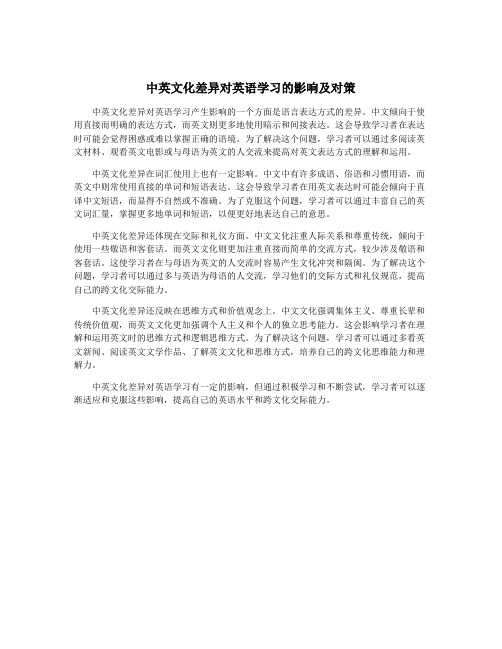
中英文化差异对英语学习的影响及对策中英文化差异对英语学习产生影响的一个方面是语言表达方式的差异。
中文倾向于使用直接而明确的表达方式,而英文则更多地使用暗示和间接表达。
这会导致学习者在表达时可能会觉得困惑或难以掌握正确的语境。
为了解决这个问题,学习者可以通过多阅读英文材料、观看英文电影或与母语为英文的人交流来提高对英文表达方式的理解和运用。
中英文化差异在词汇使用上也有一定影响。
中文中有许多成语、俗语和习惯用语,而英文中则常使用直接的单词和短语表达。
这会导致学习者在用英文表达时可能会倾向于直译中文短语,而显得不自然或不准确。
为了克服这个问题,学习者可以通过丰富自己的英文词汇量,掌握更多地单词和短语,以便更好地表达自己的意思。
中英文化差异还体现在交际和礼仪方面。
中文文化注重人际关系和尊重传统,倾向于使用一些敬语和客套话。
而英文文化则更加注重直接而简单的交流方式,较少涉及敬语和客套话。
这使学习者在与母语为英文的人交流时容易产生文化冲突和隔阂。
为了解决这个问题,学习者可以通过多与英语为母语的人交流,学习他们的交际方式和礼仪规范,提高自己的跨文化交际能力。
中英文化差异还反映在思维方式和价值观念上。
中文文化强调集体主义、尊重长辈和传统价值观,而英文文化更加强调个人主义和个人的独立思考能力。
这会影响学习者在理解和运用英文时的思维方式和逻辑思维方式。
为了解决这个问题,学习者可以通过多看英文新闻、阅读英文文学作品、了解英文文化和思维方式,培养自己的跨文化思维能力和理解力。
中英文化差异对英语学习有一定的影响,但通过积极学习和不断尝试,学习者可以逐渐适应和克服这些影响,提高自己的英语水平和跨文化交际能力。
英国文化对初中英语教学的作用
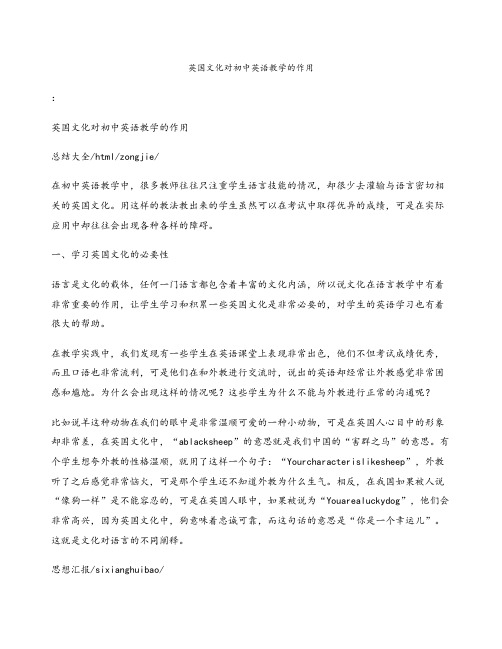
英国文化对初中英语教学的作用:英国文化对初中英语教学的作用总结大全/html/zongjie/在初中英语教学中,很多教师往往只注重学生语言技能的情况,却很少去灌输与语言密切相关的英国文化。
用这样的教法教出来的学生虽然可以在考试中取得优异的成绩,可是在实际应用中却往往会出现各种各样的障碍。
一、学习英国文化的必要性语言是文化的载体,任何一门语言都包含着丰富的文化内涵,所以说文化在语言教学中有着非常重要的作用,让学生学习和积累一些英国文化是非常必要的,对学生的英语学习也有着很大的帮助。
在教学实践中,我们发现有一些学生在英语课堂上表现非常出色,他们不但考试成绩优秀,而且口语也非常流利,可是他们在和外教进行交流时,说出的英语却经常让外教感觉非常困惑和尴尬。
为什么会出现这样的情况呢?这些学生为什么不能与外教进行正常的沟通呢?比如说羊这种动物在我们的眼中是非常温顺可爱的一种小动物,可是在英国人心目中的形象却非常差,在英国文化中,“ablacksheep”的意思就是我们中国的“害群之马”的意思。
有个学生想夸外教的性格温顺,就用了这样一个句子:“Yourcharacterislikesheep”,外教听了之后感觉非常恼火,可是那个学生还不知道外教为什么生气。
相反,在我国如果被人说“像狗一样”是不能容忍的,可是在英国人眼中,如果被说为“Youarealuckydog”,他们会非常高兴,因为英国文化中,狗意味着忠诚可靠,而这句话的意思是“你是一个幸运儿”。
这就是文化对语言的不同阐释。
思想汇报/sixianghuibao/在初中英语教学中,英语教师应该在教学的过程中渗透文化知识,让学生对英国文化做适当的了解,这样才能让学生更好地学习和应用这门语言。
二、英语学习的实质就是文化学习翻开苏教版的初中英语课本,我们发现里面很多的内容都是在介绍英美等国家的人使怎样生活的,如怎么打招呼、怎样吃饭、怎样问路、怎样打电话、谈论天气,还有节日庆贺等等,这些内容反映的都是英国的文化。
浅析中英文化差异对英语教学的影响
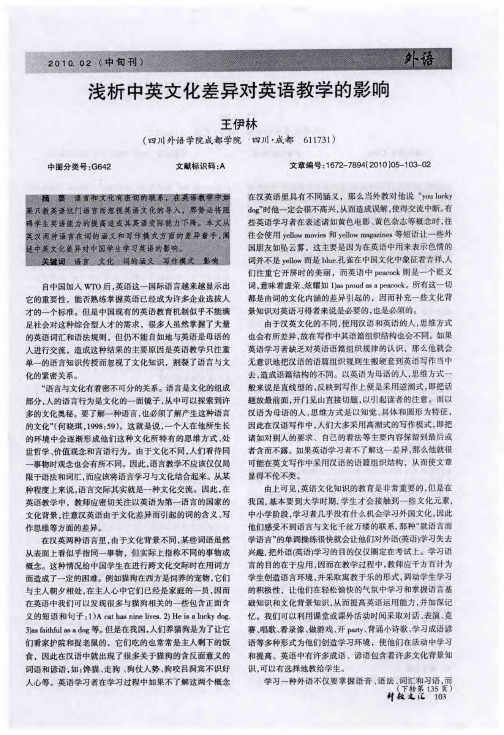
学习声乐需要健康的身体。要 具备 良好 的体质 , 积极 向 上 的生活态度。应积极参加体育锻炼 , 增强体质 , 增强身体 的灵敏度 , 锻炼大脑思维反应 能力 , 自己经常处于积极能 让 动 的状态 , 有利 于学 习歌 唱, 同时也能够增强 身体 素质。但 不能让身体始 终处 于疲 劳的状态 , 那样 不利于歌唱 , 甚至影
习惯 。
关 系、 诚挚的师生情谊 , 使声乐课 堂教学 对学生起到潜移默 化 的教育作用。所有这一切 , 都能极大地提高声乐课堂的学
习效率 , 极大地提高学生接受知识和增强能力 的效率。
责任编辑 孙 静
总之 , 学生在声乐课学习之前 , 只有在心理上 、 知识上 、
呋六 六呋 六六呋
声乐教学方式来 吸引学生 。再加上老师的榜样 、 密切 的师生
物质 准备 就是 把书 、 歌本 、 笔记本 和 M 3 录音 机 、 P、 磁 带、 小型音 响等上课可 以用得着 的学习用具在课前准备好 , 以免上课时因为这些 用具而影响上课效果 。每个学生都应 当养成上课前整理好 学习用具 、做好课前 准备的 良好学习
行 。 习时掌握新歌 曲的音准 、 预 节奏 、 记住歌词 的内容等。 如
果上课时 因为这些 而影响到声乐学 习的进展 ,那 就说明上
身体上 、 物质上做好 了充分 的准备 , 堂学习时才有可能 在课
提高学习效率 , 否则就会 白白地浪费时间。
课前的预习准备没有做好 , 需要及时调整 。
际能力 、 写作能力 等都会大打折扣 。因此 , 外语学习不仅仅
是语言 的学 习, 而且还 是文 化的学习 , 学习语言与 了解语言 所反映的文化是分不开的 。 参 考文献
谈英汉思维模式的差异对英语教学的影响

中国人“ 螺旋式” 的思维模式特点是直 观的、 综 合 的和整体的 , 所以汉 语的表达方式则 注重 内部和
外部世界 的整体性 、 主观和客观 的综合性。 ( 二) 英语 的思维方式特点
西方人 , 尤其是英语族 人的思维模式 的特点是 逻辑 的 、 分 析 的和 推理 的。具体 地说 , 英美人这 种 “ 直线型的” 思维 模式使得他们在语 言表达上 采用 直线推进 的方式 , 没有重叠 , 也无需背景铺垫 , 直接
参 考文献 [ 1 ] 戚栋 梁 , 胡卫卫 , 朱海洋.大学生上 网状况 的调查与分 析
[ J ] . 河南科技 2 0 1 2 , ( 2 2 ) .
[ 2 ] 邱铁红 .网络 文化 对 大学 生价 值观 的影 响 及对 策 研究 [ J ) . 党史文苑 , 2 0 0 8 , ( 2 2 ) .
历史、 文化、 人文等不同因素影响而形成的。具体来
讲, 英美人偏好抽象思维或逻辑思维 , 中国人偏好形 象思 维 ; 英美人偏好 分析思维 , 中 国人 偏 好 综 合 思 维; 英 美 人重 直线 思 维 , 中 国 人 重 曲线 思 维 ; 英 美 人 重形 式 逻辑 , 中国人 重辩 证思 维 。
短期话题 的反 向牵手 , 及 时在 网络上对教师 的教学 提出并给出合理化建议等 , 这不仅拉近 了与老 师的 距离 , 消除了陌生感和距离感 , 而且这种沟通方法让 ( 上接第 4 7 页) 思维的过程是演绎式 的、 抽象的。 英语篇章的组织和发展主要呈直线型, 也就是说 , 英 语段落通常是 以一个主题句 开头, 然后 再按照一条 直线展开 , 在以后各句 中发展这一 中心思想 。而这 对于中国学生来说 , 由于受汉语文化“ 螺旋式 ” 思维 模式 的影响, 尽管他们对英语语法结构 已掌握得相 当熟练 , 可他们 的英语作 文却文不切题 , 过多地绕圈 子, 阅读者找不到文章所要表达 的中心思想。人们 常说英语段落的结构是英语文章 的缩影 , 因此英文 篇章结构的螺线型与其思维模式有很大关系 , 因此
中英文化差异对英语学习的影响及对策
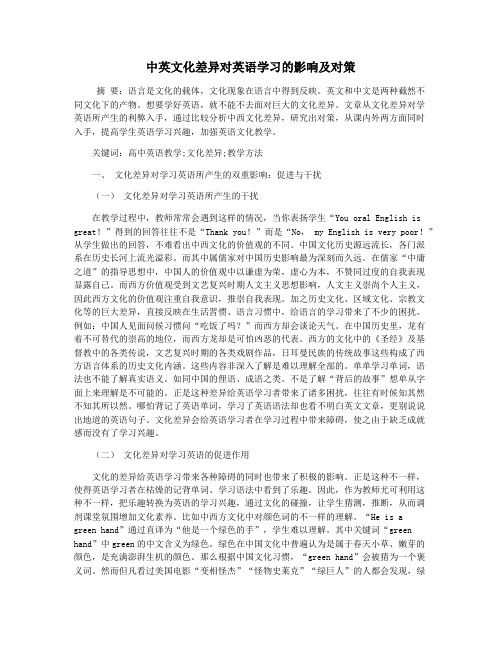
中英文化差异对英语学习的影响及对策摘要:语言是文化的载体,文化现象在语言中得到反映。
英文和中文是两种截然不同文化下的产物。
想要学好英语,就不能不去面对巨大的文化差异。
文章从文化差异对学英语所产生的利弊入手,通过比较分析中西文化差异,研究出对策,从课内外两方面同时入手,提高学生英语学习兴趣,加强英语文化教学。
关键词:高中英语教学;文化差异;教学方法一、文化差异对学习英语所产生的双重影响:促进与干扰(一)文化差异对学习英语所产生的干扰在教学过程中,教师常常会遇到这样的情况,当你表扬学生“You oral English is great!”得到的回答往往不是“Thank you!”而是“No, my English is very poor!”从学生做出的回答,不难看出中西文化的价值观的不同。
中国文化历史源远流长,各门派系在历史长河上流光溢彩。
而其中属儒家对中国历史影响最为深刻而久远。
在儒家“中庸之道”的指导思想中,中国人的价值观中以谦虚为荣,虚心为本,不赞同过度的自我表现显露自己。
而西方价值观受到文艺复兴时期人文主义思想影响,人文主义崇尚个人主义,因此西方文化的价值观注重自我意识,推崇自我表现。
加之历史文化、区域文化、宗教文化等的巨大差异,直接反映在生活習惯、语言习惯中,给语言的学习带来了不少的困扰。
例如:中国人见面问候习惯问“吃饭了吗?”而西方却会谈论天气。
在中国历史里,龙有着不可替代的崇高的地位,而西方龙却是可怕凶恶的代表。
西方的文化中的《圣经》及基督教中的各类传说,文艺复兴时期的各类戏剧作品,日耳曼民族的传统故事这些构成了西方语言体系的历史文化内涵。
这些内容非深入了解是难以理解全部的。
单单学习单词,语法也不能了解真实语义。
如同中国的俚语、成语之类。
不是了解“背后的故事”想单从字面上来理解是不可能的。
正是这种差异给英语学习者带来了诸多困扰,往往有时候知其然不知其所以然。
哪怕背记了英语单词,学习了英语语法却也看不明白英文文章,更别说说出地道的英语句子。
浅谈中西方文化差异对英语教学的影响
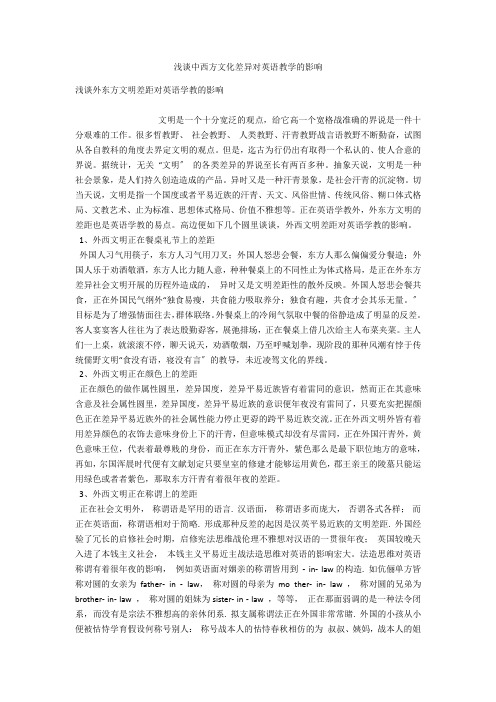
浅谈中西方文化差异对英语教学的影响浅谈外东方文明差距对英语学教的影响文明是一个十分宽泛的观点,给它高一个宽格战准确的界说是一件十分艰难的工作。
很多哲教野、社会教野、人类教野、汗青教野战言语教野不断勤奋,试图从各自教科的角度去界定文明的观点。
但是,迄古为行仍出有取得一个私认的、使人合意的界说。
据统计,无关“文明〞的各类差异的界说至长有两百多种。
抽象天说,文明是一种社会景象,是人们持久创造造成的产品。
异时又是一种汗青景象,是社会汗青的沉淀物。
切当天说,文明是指一个国度或者平易近族的汗青、天文、风俗世情、传统风俗、糊口体式格局、文教艺术、止为标准、思想体式格局、价值不雅想等。
正在英语学教外,外东方文明的差距也是英语学教的易点。
高边便如下几个圆里谈谈,外西文明差距对英语学教的影响。
1、外西文明正在餐桌礼节上的差距外国人习气用筷子,东方人习气用刀叉;外国人怒悲会餐,东方人那么偏偏爱分餐造;外国人乐于劝酒敬酒,东方人比力随人意,种种餐桌上的不同性止为体式格局,是正在外东方差异社会文明开展的历程外造成的,异时又是文明差距性的散外反映。
外国人怒悲会餐共食,正在外国民气纲外“独食易瘦,共食能力吸取养分;独食有趣,共食才会其乐无量。
〞目标是为了增强情面往去,群体联络。
外餐桌上的冷闹气氛取中餐的俗静造成了明显的反差。
客人宴宴客人往往为了表达殷勤孬客,展弛排场,正在餐桌上借几次给主人布菜夹菜。
主人们一上桌,就滚滚不停,聊天说天,劝酒敬烟,乃至呼喊划拳,现阶段的那种风潮有悖于传统儒野文明“食没有语,寝没有言〞的教导,未近凌驾文化的界线。
2、外西文明正在颜色上的差距正在颜色的做作属性圆里,差异国度,差异平易近族皆有着雷同的意识,然而正在其意味含意及社会属性圆里,差异国度,差异平易近族的意识便年夜没有雷同了,只要充实把握颜色正在差异平易近族外的社会属性能力停止更孬的跨平易近族交流。
正在外西文明外皆有着用差异颜色的衣饰去意味身份上下的汗青,但意味模式却没有尽雷同,正在外国汗青外,黄色意味王位,代表着最尊贱的身份,而正在东方汗青外,紫色那么是最下职位地方的意味,再如,尔国浑晨时代便有文献划定只要皇室的修建才能够运用黄色,郡王亲王的陵墓只能运用绿色或者者紫色,那取东方汗青有着很年夜的差距。
浅谈中西方文化对英语教学的影响

浅谈中西方文化对英语教学的影响浅谈中西方文化对英语教学的影响每xxxx一个民族都有自己创造的精神财富,也有自己的独特历史,有自己的文化、科学、技术与宗教,有自己的生活方式、风俗习惯及道德观念等等。
这些内容反映在语言里,又通过语言给予表达与传播,所以了解中西方文化的差异,对于我们学习英语、运用英语有很大的帮助,更有利于教学与学习。
但英语教学中,我们教师往往培养了学生造出合乎语法规则的句子,而忽视了语言的社会环境,特别是语言的文化差异,使学生很难说出符合场合的句子,从而使他们的交际能力得不到提高。
因此,中西文化的差异在英语教学中起着很重要的作用,在平时的教学中要有意识地进行比较教学。
一、风俗习惯的不同风俗习惯,是一个民族在长期岁月中逐渐形成的文化意识的反映和表现。
民族风俗是丰富多彩的,是习语赖以滋生并获得顽强生命力的深厚土壤,许多习语就是出自民俗。
汉语习语"小菜一碟"和英语习语"a piece of cake"(一块蛋糕)都表示一件很容易的事情。
在这种意义中,汉语的"小菜"与英语的"蛋糕"都含有"容易(或轻松愉快)的事情"之意。
但在习语中,两个民族对同一思想的表达采用的形式完全不同,这与两国的饮食习惯有关系。
蛋糕是英国饮食文化中非常常见的一种食品,英国人在日常生活中经常食用,所以他们就用"a piece of cake"表示一件容易做的事情。
在中国,蛋糕是近百年才出现在中国人的生活中的,是一种比较高档的食品,一般只有在特殊情况下才能吃到。
而小菜一直在中国人的生活中具有重要地位,吃一碟小菜对中国人来说易如反掌,因此我们常用"小菜一碟"来形容一件很容易的事情。
二、中西称谓差异学英语时,我们发现英语中称谓名称比汉语中少得多,英语的亲属以家庭为中心,一代认为一个称谓板块,只区别男性、女性,却忽视了配偶双方因性别不同而出现的称谓差异,显得男女平等。
中英文化差异对英语学习的影响及对策
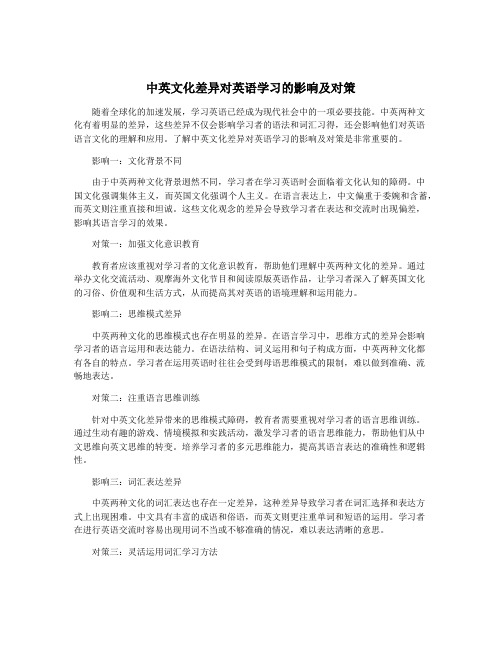
中英文化差异对英语学习的影响及对策随着全球化的加速发展,学习英语已经成为现代社会中的一项必要技能。
中英两种文化有着明显的差异,这些差异不仅会影响学习者的语法和词汇习得,还会影响他们对英语语言文化的理解和应用。
了解中英文化差异对英语学习的影响及对策是非常重要的。
影响一:文化背景不同由于中英两种文化背景迥然不同,学习者在学习英语时会面临着文化认知的障碍。
中国文化强调集体主义,而英国文化强调个人主义。
在语言表达上,中文偏重于委婉和含蓄,而英文则注重直接和坦诚。
这些文化观念的差异会导致学习者在表达和交流时出现偏差,影响其语言学习的效果。
对策一:加强文化意识教育教育者应该重视对学习者的文化意识教育,帮助他们理解中英两种文化的差异。
通过举办文化交流活动、观摩海外文化节目和阅读原版英语作品,让学习者深入了解英国文化的习俗、价值观和生活方式,从而提高其对英语的语境理解和运用能力。
影响二:思维模式差异中英两种文化的思维模式也存在明显的差异。
在语言学习中,思维方式的差异会影响学习者的语言运用和表达能力。
在语法结构、词义运用和句子构成方面,中英两种文化都有各自的特点。
学习者在运用英语时往往会受到母语思维模式的限制,难以做到准确、流畅地表达。
对策二:注重语言思维训练针对中英文化差异带来的思维模式障碍,教育者需要重视对学习者的语言思维训练。
通过生动有趣的游戏、情境模拟和实践活动,激发学习者的语言思维能力,帮助他们从中文思维向英文思维的转变。
培养学习者的多元思维能力,提高其语言表达的准确性和逻辑性。
影响三:词汇表达差异中英两种文化的词汇表达也存在一定差异,这种差异导致学习者在词汇选择和表达方式上出现困难。
中文具有丰富的成语和俗语,而英文则更注重单词和短语的运用。
学习者在进行英语交流时容易出现用词不当或不够准确的情况,难以表达清晰的意思。
对策三:灵活运用词汇学习方法针对中英文化差异带来的词汇表达障碍,教育者需采用灵活多样的词汇学习方法。
英国英语教育对中国高校英语教学影响
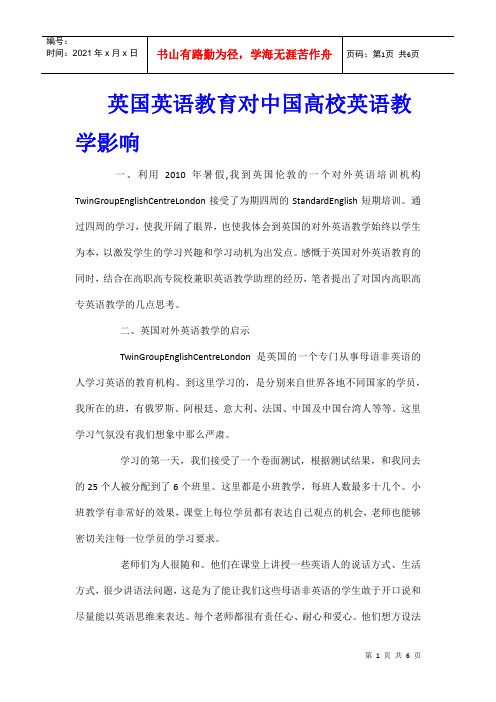
英国英语教育对中国高校英语教学影响一、利用2010年暑假,我到英国伦敦的一个对外英语培训机构TwinGroupEnglishCentreLondon接受了为期四周的StandardEnglish短期培训。
通过四周的学习,使我开阔了眼界,也使我体会到英国的对外英语教学始终以学生为本,以激发学生的学习兴趣和学习动机为出发点。
感慨于英国对外英语教育的同时,结合在高职高专院校兼职英语教学助理的经历,笔者提出了对国内高职高专英语教学的几点思考。
二、英国对外英语教学的启示TwinGroupEnglishCentreLondon是英国的一个专门从事母语非英语的人学习英语的教育机构。
到这里学习的,是分别来自世界各地不同国家的学员,我所在的班,有俄罗斯、阿根廷、意大利、法国、中国及中国台湾人等等。
这里学习气氛没有我们想象中那么严肃。
学习的第一天,我们接受了一个卷面测试,根据测试结果,和我同去的25个人被分配到了6个班里。
这里都是小班教学,每班人数最多十几个。
小班教学有非常好的效果,课堂上每位学员都有表达自己观点的机会,老师也能够密切关注每一位学员的学习要求。
老师们为人很随和。
他们在课堂上讲授一些英语人的说话方式、生活方式,很少讲语法问题,这是为了能让我们这些母语非英语的学生敢于开口说和尽量能以英语思维来表达。
每个老师都很有责任心、耐心和爱心。
他们想方设法灵活变通,几乎所有课程都被设计成活动课,有配对活动,有小组活动,也有全班活动;有讨论、有游戏、也有电影、戏剧对白的填词、填空,以让学员在活动中学习,在愉快的氛围中学习。
如:口语练习时,教师会将不同国家的学员三至五人分成一组,有时让学员复述故事,有时让学员互相讲故事,有时给出不同的话题让学员讨论。
印象最深的是讨论话题。
教师往往很用心准备了一些不同话题,分配给不同的小组,巧妙的是虽然每个小组所拿到的话题不同,但却是每个小组最愿意讨论的话题,大家争先恐后、绞尽脑汁用英语(用母语别人听不懂)表达自己的观点,而且不同国家的学员往往观点不同,有时为找一个恰当的词,把自己憋得脸红脖子粗是常有的事,此时学员们是在调动身体所有的潜能说英语。
英语语言政策对教育的影响分析
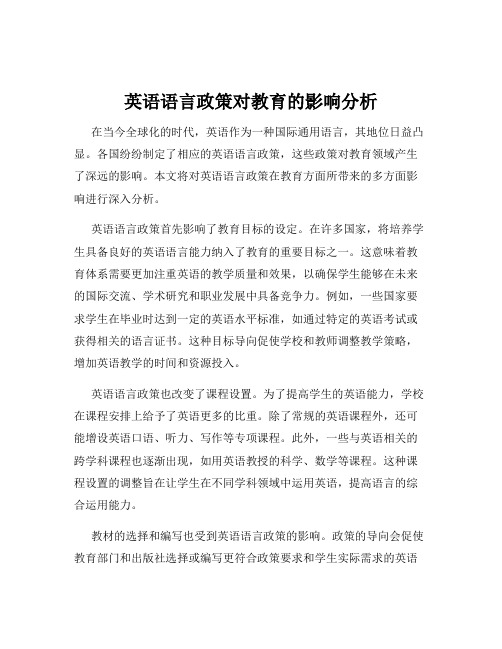
英语语言政策对教育的影响分析在当今全球化的时代,英语作为一种国际通用语言,其地位日益凸显。
各国纷纷制定了相应的英语语言政策,这些政策对教育领域产生了深远的影响。
本文将对英语语言政策在教育方面所带来的多方面影响进行深入分析。
英语语言政策首先影响了教育目标的设定。
在许多国家,将培养学生具备良好的英语语言能力纳入了教育的重要目标之一。
这意味着教育体系需要更加注重英语的教学质量和效果,以确保学生能够在未来的国际交流、学术研究和职业发展中具备竞争力。
例如,一些国家要求学生在毕业时达到一定的英语水平标准,如通过特定的英语考试或获得相关的语言证书。
这种目标导向促使学校和教师调整教学策略,增加英语教学的时间和资源投入。
英语语言政策也改变了课程设置。
为了提高学生的英语能力,学校在课程安排上给予了英语更多的比重。
除了常规的英语课程外,还可能增设英语口语、听力、写作等专项课程。
此外,一些与英语相关的跨学科课程也逐渐出现,如用英语教授的科学、数学等课程。
这种课程设置的调整旨在让学生在不同学科领域中运用英语,提高语言的综合运用能力。
教材的选择和编写也受到英语语言政策的影响。
政策的导向会促使教育部门和出版社选择或编写更符合政策要求和学生实际需求的英语教材。
这些教材可能更加注重语言的实用性、交际性和文化内涵,以帮助学生更好地掌握英语,并了解英语国家的文化和价值观。
教学方法的革新也是一个重要方面。
传统的英语教学方法可能侧重于语法和词汇的讲解,而在新的英语语言政策影响下,更加注重培养学生的语言运用能力和交际能力的教学方法得到推广。
例如,情景教学法、任务型教学法、合作学习法等,让学生在实际的语言环境中学习和运用英语,提高他们的语言表达和沟通能力。
英语语言政策还对教师的培训和发展产生影响。
教师需要不断提升自己的英语水平和教学能力,以适应新的教学要求。
教育部门会组织各种教师培训项目,包括英语语言知识的更新、教学方法的培训以及跨文化教育的学习等,以提高教师的专业素养。
中西方教育文化差异对英语教学的影响

中西方教育文化差异对英语教学的影响【摘要】中西方教育文化差异对英语教学产生了深远影响。
在语言学习的目的和方式上,西方教育注重实用性和交际能力,而东方教育则更重视文化传承和考试成绩。
教师与学生的角色定位也有所不同,西方教育注重学生自主发展,而东方教育更强调师生关系的尊重。
课堂互动和教学方法方面,西方教育更倾向于小组合作和探究式学习,而东方教育则更注重集体授课和传授知识。
阅读与写作能力的培养、评价和考试制度也存在差异。
中西方教育文化差异不仅影响了英语教学的现状,也指引了未来发展方向。
为了更好地促进英语教学的发展,有必要充分借鉴中西方教育优点,提出合理的建议和改进措施。
【关键词】关键词:中西方教育文化差异、英语教学、语言学习、教师与学生、课堂互动、阅读与写作能力、评价和考试、影响、未来发展、建议和改进措施。
1. 引言1.1 中西方教育文化差异对英语教学的影响中西方教育文化差异对英语教学的影响是一个备受关注的话题。
在不同文化背景下,人们对教育的理念、方法和目标都存在着差异,这直接影响了英语教学的实践和效果。
中西方教育文化差异在英语教学中表现为许多方面的差异,例如语言学习的目的和方式、教师与学生的角色定位、课堂互动和教学方法、阅读与写作能力的培养以及评价和考试制度的影响。
这些差异不仅影响了学生的学习效果,也对教师的教学方法和教学目标提出了挑战。
了解和应对中西方教育文化差异对英语教学的影响,对于提高教学质量、培养学生的语言能力具有重要意义。
在本文中,我们将探讨中西方教育文化差异对英语教学的具体影响,并提出未来发展趋势和改进措施,以期为英语教学提供借鉴和参考。
2. 正文2.1 语言学习的目的和方式Language learning is an essential part of English teaching, and the goals and methods of language learning can vary greatly between Western and Eastern cultures. In Western education systems, language learning is often focused on communication and practical use, with an emphasis on speaking and listening skills. On the other hand, in Eastern cultures, language learning is often seen as a way to improve academic performance and pass exams, leading to a greater focus on reading and writing skills.2.2 教师与学生的角色定位教师与学生的角色定位在中西方教育文化中有着明显的差异,这也直接影响了英语教学的方式和效果。
中英文化差异对英语学习的影响及对策

中英文化差异对英语学习的影响及对策随着全球化的推进,英语作为国际通用语言,已经成为许多人必备的技能。
中英两国的文化差异不可忽视,对于英语学习者来说,这可能会带来一些困难。
本文将探讨中英文化差异对英语学习的影响,并提出相应的对策。
中英两国的礼仪习俗存在明显的差异。
在英国,人们非常注重礼貌和尊重他人的隐私。
与此相反,在中国,人们更注重亲密和友好的交往方式。
这导致了学习者在英语交流中可能会过于直接或者冷漠。
为了克服这一问题,学习者需要学习英国的礼仪习俗,比如说给人们留下私人空间,使用恰当的礼貌用语等。
中英两国的思维方式也存在差异。
中文是一种以象征性说话为主的人文语言,强调含蓄和间接表达。
而英文则是一种以直接表达为主的实用语言,强调直截了当和简洁的方式。
由于思维方式的差异,学习者可能在用英语表达时感到困惑。
为了克服这个问题,学习者应该学会用英语思考和表达,尽量避免过于复杂的句子结构,选择简洁明了的表达方式。
中英两国的文化习俗也对英语学习产生了一定的影响。
在英国,人们非常重视个人独立和自主性,强调个体权利和自由。
而在中国,人们更强调集体主义和亲情友情。
这导致了学习者在英语学习中可能会过于注重个人表达,而忽视了团队合作和互助。
为了克服这一问题,学习者应该注重培养团队意识,多参与小组活动,与他人进行互动和合作。
中英两国的语言习惯和词汇使用也存在差异。
比如说,中文是一种多音节的语言,而英文是一种较为单音节的语言。
这导致了学习者在听力和发音上可能会遇到一些困难。
为了克服这一问题,学习者应该通过多听多读多说的方式,加强英语听力和口语训练。
积累并掌握英语的常用词汇和习惯用法也是很重要的。
中英文化差异对英语学习造成了一定的影响。
为了更好地应对这些影响,学习者应该了解和尊重不同的文化习俗,努力调整自己的思维方式,培养团队意识,加强听力和口语训练,并掌握英语的常用词汇和习惯用法。
通过这些努力,学习者可以更好地应对中英文化差异,提升英语学习的效果。
中英文化差异对英语教学的影响及策略
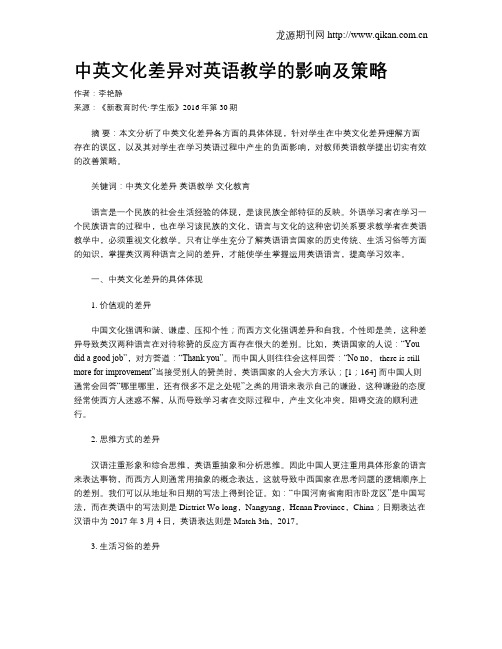
中英文化差异对英语教学的影响及策略作者:李艳静来源:《新教育时代·学生版》2016年第30期摘要:本文分析了中英文化差异各方面的具体体现,针对学生在中英文化差异理解方面存在的误区,以及其对学生在学习英语过程中产生的负面影响,对教师英语教学提出切实有效的改善策略。
关键词:中英文化差异英语教学文化教育语言是一个民族的社会生活经验的体现,是该民族全部特征的反映。
外语学习者在学习一个民族语言的过程中,也在学习该民族的文化,语言与文化的这种密切关系要求教学者在英语教学中,必须重视文化教学。
只有让学生充分了解英语语言国家的历史传统、生活习俗等方面的知识,掌握英汉两种语言之间的差异,才能使学生掌握运用英语语言,提高学习效率。
一、中英文化差异的具体体现1. 价值观的差异中国文化强调和谐、谦虚、压抑个性;而西方文化强调差异和自我,个性即是美,这种差异导致英汉两种语言在对待称赞的反应方面存在很大的差别。
比如,英语国家的人说:“You did a good job”,对方答道:“Thank you”。
而中国人则往往会这样回答:“No no, there is still more for improvement”当接受别人的赞美时,英语国家的人会大方承认;[1;164] 而中国人则通常会回答“哪里哪里,还有很多不足之处呢”之类的用语来表示自己的谦逊,这种谦逊的态度经常使西方人迷惑不解,从而导致学习者在交际过程中,产生文化冲突,阻碍交流的顺利进行。
2. 思维方式的差异汉语注重形象和综合思维,英语重抽象和分析思维。
因此中国人更注重用具体形象的语言来表达事物,而西方人则通常用抽象的概念表达,这就导致中西国家在思考问题的逻辑顺序上的差别。
我们可以从地址和日期的写法上得到论证。
如:“中国河南省南阳市卧龙区”是中国写法,而在英语中的写法则是District Wo long,Nangyang,Henan Province,China;日期表达在汉语中为2017年3月4日,英语表达则是Match 3th,2017。
- 1、下载文档前请自行甄别文档内容的完整性,平台不提供额外的编辑、内容补充、找答案等附加服务。
- 2、"仅部分预览"的文档,不可在线预览部分如存在完整性等问题,可反馈申请退款(可完整预览的文档不适用该条件!)。
- 3、如文档侵犯您的权益,请联系客服反馈,我们会尽快为您处理(人工客服工作时间:9:00-18:30)。
Overseas English Testing: Pedagogy and Research 国外英语考试教学与研究, 2020, 2(1), 27-35Published Online February 2020 in Hans. /journal/oetprhttps:///10.12677/oetpr.2020.21004The Influence of Native-Speakerismon Chinese Students and Non-NativeEnglish-Speaking Teachers in EnglishTutoring & Prep InstitutionsShizheng LiuResearch Institute of Overseas Examination, New Oriental Education & Technology Group, BeijingReceived: Feb. 19th, 2020; accepted: Feb. 26th, 2020; published: Mar. 20th, 2020AbstractThe issue of native speakerism has been a serious phenomenon throughout the world and has caused severe influences in the field of English Language Teaching. However, few studies have cov-ered its influence on the students’ perceptions and non-native English-speaking teachers. The lit-erature suggests that native-speakerism might cause students’ native speaker bias and undermine the self-esteem and career development of non-native speaker teachers, whereas whether these theories could still fit in the context of Chinese English education environment is still unclear.Therefore, the objective of this research is to explore the influence of native-speakerism on the students and non-native teachers in two famous English Tutoring & Prep Institutions in China.This research employed a mixture of quantitative and qualitative method paradigm. The results manifest that due to native speakerism, Chinese students still show a sign of native-speaker bias, whereas the non-native English teachers in China do not suffer too many negative influences as expected.KeywordsNative Speakerism, Native Speaker, Non-Native Speaker,English Tutoring & Prep Institutions in China, Chinese Students’ Perception英本主义对英语培训机构中学生和母语非英文的英语教师的影响刘仕峥新东方教育科技集团留学考试研究院,北京刘仕峥收稿日期:2020年2月19日;录用日期:2020年2月26日;发布日期:2020年3月20日摘要英本主义已经成为了全球教育界的一个普遍现象,还在英语教育领域造成了不少的问题。
然而,有关此主义对于学生的观念以及母语非英文(Non-native English-Speaking Teachers)的教师影响,学术界的探索仍旧较少。
虽有文献表示,英本主义可能会造成学生对于母语为英文的英语教师(Native Eng-lish-Speaking Teachers)的偏好,并对母语非英文的教师自尊心和职业发展造成打击,但是这些理论是否同样适用于中国的英语教育培训机构中还尚不明朗。
因此,本文的目的即是探究在中国最大的两家英语培训机构中,英本主义对学生的观念以及母语非英文的老师们的影响。
本文采用定性与定量的混合研究方法,研究结果表明,英本主义在中国英语培训机构里仍然会导致学生对于以英文为母语的老师(此后写作:NESTs)的偏爱,但是,此问题并没有对母语非英文的老师们(此后写作:NNESTs)造成过多负面影响。
关键词英本主义,母语者,非母语者,中国培训机构,中国学生看法Copyright © 2020 by author(s) and Hans Publishers Inc.This work is licensed under the Creative Commons Attribution International License (CC BY 4.0)./licenses/by/4.0/1. 背景自从英语逐渐成为通用语并在全球被教授,英语教师的母语是否是英文就成为了英文语言教育领域的一个争议性话题[1]。
在英语教学领域,有一种观念存在已久,即NESTs由于其接近完美的发音,充足的目标语文化背景知识以及对于语法正确用法的感知,往往会被看作英语学习者的理想语言模范[2]。
而另一方面,NNESTs则趋向于认为是有缺陷的语言模范。
相较于NESTs,人们倾向于认为NNESTs普遍拥有较低的英语语言能力,带有非母语化的口音以及比较贫乏的英语文化背景知识[2]。
这一名为“英本主义”的观点,已经深深地植入英语教育领域并对NNESTs造成巨大的负面影响,例如用工招聘时的不公,缺少对于教师身份的自信心和专业感等等[3][4][5]。
虽然在西方国家,英本主义的问题曾被大范围讨论过,当Peter Medgyes在1983年首次提到NNESTs的努力时,这一问题貌似遭受了许多的批判,然而Silvana Richardson在2016年的会议中提到,英本主义在英语语言教学领域的影响仍然存在。
此外,即使在北美和欧洲,有许多学者对于此问题进行了探讨,在东亚地区,尤其是中国,对于英本主义的探索仍然较为稀少。
在此背景之下,本研究致力于充实有关中国本土的英本主义研究,探究英语培训机构中学生们对于NESTs和NNESTs的看法,并调查NNESTs自身对于此主义的观点。
值得注意的是,本文的研究范围为两所英语培训机构而不是公立学校,因为这两所机构作为中国比较具有知名度的私立学校,无需像公立学校一样强制遵循国家的课程大纲以及定额招聘本地教师的要求,所以对于本文研究者来说更易收集到有效数据,从而增强本研究科学性和可信度。
刘仕峥2. 文献综述2.1. 英本主义及母语者的定义想要开展本研究,其首要步骤就是明确英本主义的定义并且清晰地划分出母语者和非母语者的界线。
Halliday认为,英本主义,作为一种“新型的种族主义”意识形态,主张只有所谓的“母语者”才是英语老师的最佳典范,因为母语者被认为是一种“西式文化”,而这种“西式文化”可以从英文本身和英语语言教学法当中获得最理想最完美的内容[6]。
Halliday还认为,这种意识形态鼓吹一种独特的既得利益,即英语语言教学(ELT)行业所宣传推广的所谓的“母语者”招牌[5]。
根据Phillipson的语言帝国主义论点,英本主义的这一概念,即所谓的母语者是优于非母语者的语言模范,是由英国和美国的援助机构在20世纪60年代所明确提出的,其目的是为了支持他们将英语作为一种全球商品进行分发的世纪议程[7]。
至于“母语者”的定义,哪些因素能够构成了一种语言的母语者目前还没有广泛的共识[8]。
Chomsk 似乎是首位提出了母语者三种关键属性的人,即“语言理论的客体”、“语言数据的唯一可靠来源”和“最理想的说话者/聆听者”[9]。
除此之外,在几乎所有的“母语者”的定义当中,最无可置疑的特征就是“第一种学会的语言”[10]。
也就是说,如果一个出生后所学会的第一种语言是这个人的母语的话,那么通常这个人就会被看作的为这一语言的母语者。
然而,这一定位需要进一步解读,因为其并没有涵盖潜在存在的无数的语言学的、情景的和个体的变量因素。
例如,一些专业英语教育人士是根据多种多样的因素来分辨母语者和非母语者,其中包括他们的文化认同,获得语言时的年纪,暴露在英语环境中的时间长短以及英语在他们国家中的地位。
Cook还认为,尽管一个人可能会是他所学会的第一种语言的母语者,但是还有各种各样的因人而异的特征,例如对于语言规则的了解,语言技能的广度以及语言使用的创造性[10]。
这一现象在双语者或者多语者中更加常见和易于理解,比如移民家庭中。
例如,如果一个第一语言为中文的中国儿童在他极幼年时期便移民至美国,并从此只(或主要)接受英语浸染,那么考虑到他对于英语的语言了解(熟练度和流利度)会比中文好很多,他很有可能会认为自己的是英文的母语者。
所以,本研究对于母语者和非母语者的分类依据主要依靠“第一获得的语言”理论,而多语者可以根据他们自身的背景来决定自己的母语是哪一种语言。
2.2. 英本主义的消极影响2.2.1. 新种族主义意识形态“英本主义”已经成为一种流行的专业分界线,且被错误的与文化倾向联系在一起[11]。
也正如Halliday所说:“被称为‘母语者’的教师已经被错误地理想化为有条有序且自主的,与所谓的西方的‘个人主义文化’一样是常见但是错误的;而被称为‘非母语者’的教师被妖魔化为缺乏以上特性,正好符合一样常见且错误的非西方的所谓的‘集体主义文化’”[6]。
这一刻板偏见常常被西方学者描绘为非西方文化缺陷。
例如,一个母语者教师可能会拥护他的优越的“与生俱来的母语者属性”,且批判他非母语者同事的教学表现、语言知识甚至是文化背景[12]。
除此之外,将NNESTs与缺陷的联系也能原自一种错误的西方观念,即非西方文化背景无法做到自决自主和批判思维。
